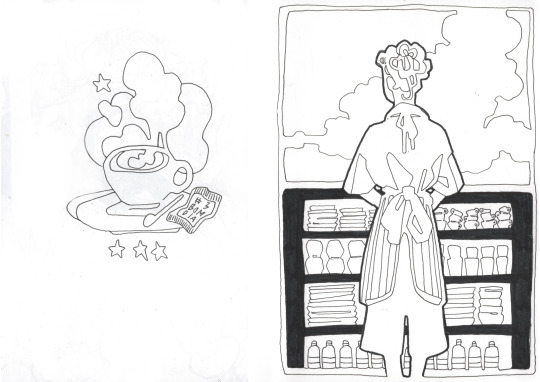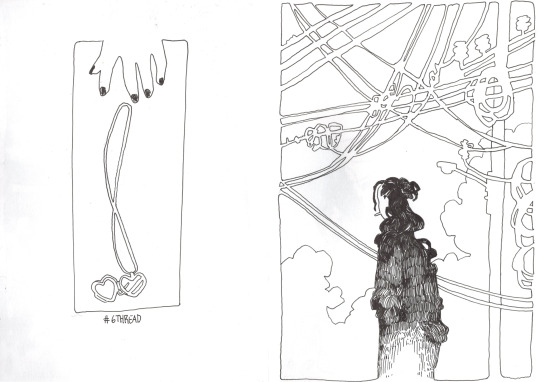#correlation
Photo

Lead pollution in Greenland ice shows rise and fall of ancient European civilizations.
429 notes
·
View notes
Text

Civanticism — The reason of Humanism and the compassion of Buddhism, with a touch of snark for good measure.
https://www.civanticism.com/
17 notes
·
View notes
Text
INFP-A Personality: Know them Better!
1. Comfortable Being Themselves
The assertive nature of the assertive mediator is something that makes it seem very different from its turbulent mediator relative. Unlike the turbulent mediators who are likely to beat themselves up from mistakes and flaws, the assertive mediators are far more likely to accept and even embrace their flaws.
The assertive personality is one that is comfortable being themselves and is not as caught up in the opinions of others. When paired with a mediation type, this assertive personality means that this person will be able to take in the opinions of others while not being critical about their meanings.
2. Look on the Brighter Side
The mediation personality is one that is primarily framed with an idealistic vision and sense of the better things in life. Mediators are people that believe that things are inherently good so that they can see things in a better light. Paired with the assertive personality trait, that feeling can become even stronger.
Assertive personality types are ones that see things as good more often than they see things as being bad. This combines with the idealism of the mediation personality to create a mix of both positive forward-thinking and a feeling that everything will be okay.
3. Discount Their Mistakes
Whether you see it as a good or a bad thing, the assertive mediator is very quick to dismiss their flaws and mistakes after they are noticed. This comes from the idea that they do not want the negative thoughts to take up time or space in their heads. The assertive mediator would rather think about ways to get better than to dwell on negative emotions.
An assertive mediator is going to be far more likely to look for ways to better themselves and their flaws than to get caught up in them and just feel bad. It is personality traits like these that allow this type of person to take things less seriously so that they can get on with growth and improvement.
4. Consider More Positive Thoughts
While it is still normal and common for assertive mediators to apply labels to themselves, they do so with substantially less weight than the turbulent mediators would. For example, if an assertive mediator deemed themselves “boring” and a turbulent mediator did the same, the turbulent mediators would take it much more to heart than the assertive mediator.
It is said that the assertive mediator sees life through “rose-tinted lenses” because they are often looking to see the best side of things. This optimistic attitude helps them to think better of themselves as well as to see others as better people.
5. Express Self-Assurance
The turbulent mediator’s personality, as we have seen, can face some serious struggles when faced with stressful situations, but the assertive mediator seems to be the exact opposite. The sense of optimism and self-assurance that everything will be alright helps drive the assertive mediator to achieve their goals.
Despite the benefits of having a heightened sense of inner confidence, this can also come back to hurt assertive mediators if they are not careful. Not taking the time to address more serious issues as they arise can have those issues compound and get worse if not addressed.
6. Great at Encouraging a Group
Something that helps the assertive mediators to lead groups effectively is their sense of confidence in themselves and in others. They do what they want, the way they want to, and very little is going to get in their way to stop them from achieving their goals.
An assertive mediator can stand before a group and share their vision without caring about the negativity or alternate viewpoints that go against their vision. This ability to take charge and get a group to a final goal is something in which the assertive trait helps greatly.
7. May Not Be Great at Conveying Desired Outcomes
Despite being good at leading groups to a goal, everything in between is often where the assertive mediators can have some rough patches. Leading a team requires playing to the strengths and weaknesses of a team so that the job gets done. This is not always easy for the assertive mediator.
Since they believe highly in the abilities of others and value their work, the assertive mediator can struggle to outline concrete goals and aspirations to a team. They can get the group eager to work, but they may not always provide the clearest direction.
8. Don’t Outwardly Express Many Emotions
The ability of the assertive mediator to simply brush off the comments of others is both a blessing and a curse. While they can get over some rude or insulting comments, they also find it harder to outwardly express their emotions due to a more subdued desire for the approval of others.
This can make the assertive mediator appear cold, as they are not searching for anyone’s compliments or praise in a relationship.
9. Live with Less Regret
Mediators, in general, are a category of personalities that are known for their ability to keep learning throughout their entire lives. This can have negative consequences on the turbulent traits as it leaves them feeling a sense of regret. For the assertive, however, their continued learning just leaves them with more confidence.
The ability to not get too caught up in their own failures and pitfalls allows assertive personalities the freedom to not feel much regret.
10. Have Quieter Behavior
Even though the assertive mediator would seem like someone who would be very outgoing and one to share their ideas, they are actually rather reserved. Their quieter behavior means that it is often hard to get to know these kinds of people because they are less likely to expose their emotions and inner feelings.
Assertive mediators are perfectly content with being themselves, and that allows them to be just fine with not having many people with whom to talk.
11. Comfortable Being with Themselves
One of the standout features of the assertive mediator is that they really don’t need to value how others see them. This often-sighted freedom from judgment allows them to be themselves openly as they know that the opinions others have of them hold little weight.
Compared to the turbulent mediator, the assertive mediator is going to be very open to who they are and what they stand for.
12. Don’t Take Criticism Seriously
Branching off the idea that they are very open about themselves, assertive mediators are not going to really take criticism to heart. They will listen to what others have to say and criticisms of them, but they are not very likely to change anything. This is often a good way to preserve themselves, but it can lead to arrogance.
13. Hesitate to Ask for Help
Even when they need it the most, the assertive mediator may appear stubborn as they fail to reach out for the needed help. This is not a healthy trait, as it is entirely human to reach out and ask for help when it is needed the most. Assertive mediators are very good at brushing off opinions, but they are just as hesitant to accept help.
Conclusion
Who would have thought that two small variations in a larger personality would have so many differences between them. We see the turbulent mediator look inward and remain reserved and the assertive mediators speak their minds and live without regret. Understanding how each of these personalities lives and acts will give you the power to better understand yourself and work better with others in every interaction going forward.
#INFP#INFP-A#INFP A#MBTI#Comparison#strength#myers briggs#typology#candy writings#9w1#4w5#enneagram#correlation
6 notes
·
View notes
Text







first week of inktober (first time!! eek!!)
~prompts are writings from paulo kellerman
2 / 3 / 4
#artists on tumblr#inktober#traditional art#ink drawing#correlation#storage#good morning#longing#root#thread#pleasure#maraia#paulo kellerman
10 notes
·
View notes
Text

According to a recent study, children laugh about 200 times a day while the average adult only laughs 4. If you haven’t laughed yet today, do something silly with your friends.
The world presents many opportunities to laugh, we just have to take them!
#laughing#funfacts#happiness#correlation#besilly#foryourhealth#opportunities#healingpower#nojoke#stayingpositive#humor#acrylic#painting#artoftheday#artists on tumblr#artwork#dailyartwork#lowbrowart#outsiderart#kunst#flomm#flommist#beercoaster#bierdeckel#handpaintedbeercoaster#perspective#happyrobots
11 notes
·
View notes
Text
Watch "Let's talk about stats, rates, correlation and causation..." on YouTube
youtube
4 notes
·
View notes
Text




Here are the latest release on Numen Records including Tim Angrave Rachel Modest, Dave Pemberton, Frank Joshua . Check out these and more releases, join us now
Spotify. https://open.spotify.com/playlist/3yiOz97R4gwEtWmBDzhV0x...
Link. https://linktr.ee/mozezofficial
#music#numen records#spotify#chillout#downtempo#triphop#lounge#ambient#tranquille#releases#outnow#victim#mayan#correlation#night train#indie#gratitude#grazie
5 notes
·
View notes
Text
My Asexuality increases as my tolerance for people's nonsense decreases
#Asexual#Asexuality#Correlation#Causation?#👀#Literally the more idiots i encounter the less i want to be in a relationship with anyone (especially a man)#Maybe im just slowly gaining a stronger preference for women romantically#Women are so much nicer than men in my experience and more respectful.of boundaries
6 notes
·
View notes
Text

Doctor Beverly Crusher
@SpaceDocMom
One of the hardest parts of my job is to convince health-privileged people that the things they imagine as "healthy living" and are thus "keeping them healthy" are more steeped in that privilege than in actual health science. Correlation is not causation. emojis: black heart, blue heart, masked
3:19 PM · Apr 15, 2023
#doctor crusher#star trek#star trek the next generation#support#health care#healthcare#medicine#correlation#wear your masks#covid is not over
3 notes
·
View notes
Text
Briefly stated, the Gell-Mann Amnesia effect is as follows. You open the newspaper to an article on some subject you know well. In Murray's case, physics. In mine, show business. You read the article and see the journalist has absolutely no understanding of either the facts or the issues. Often, the article is so wrong it actually presents the story backward—reversing cause and effect. I call these the "wet streets cause rain" stories. Paper's full of them.
In any case, you read with exasperation or amusement the multiple errors in a story, and then turn the page to national or international affairs, and read as if the rest of the newspaper was somehow more accurate about Palestine than the baloney you just read. You turn the page, and forget what you know.
- Michael Crichton, American author
#Michael Crichton#quote#media#newspapers#science#scientists#journalism#journalists#misinformation#correlation#report#reporting#reports#ignorance#mistakes#errors#wrong#belief
2 notes
·
View notes
Photo



A story in 3 acts:
9 notes
·
View notes

